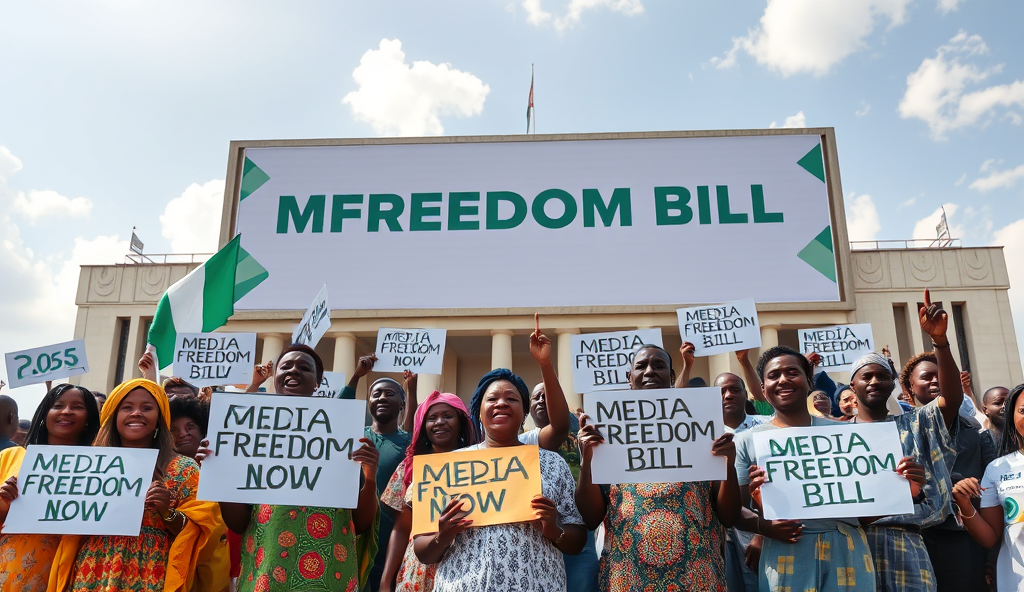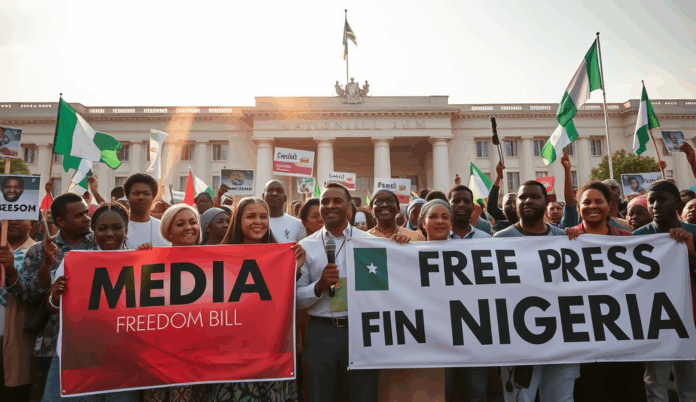Introduction to the Media Freedom Bill in Nigeria
The Media Freedom Bill represents a pivotal legislative effort to redefine press freedom and journalists’ rights protection in Nigeria’s evolving democratic landscape. Proposed as an amendment to existing media censorship laws, it seeks to address longstanding gaps in Nigeria media regulation reforms while balancing national security concerns.
Recent debates in the National Assembly highlight the bill’s potential to strengthen legal frameworks for Nigerian press operations, particularly after high-profile cases like the 2022 arrest of Premium Times journalists. If passed, it could significantly reduce government media control policies that have historically hindered investigative reporting.
This proposed legislation builds upon Nigeria’s Freedom of Information Act updates while introducing new safeguards against arbitrary media shutdowns. The next section will explore how these developments connect to Nigeria’s complex historical relationship with press freedom.
Key Statistics

Historical Background of Media Freedom in Nigeria
The Media Freedom Bill represents a pivotal legislative effort to redefine press freedom and journalists' rights protection in Nigeria's evolving democratic landscape.
Nigeria’s press freedom journey reflects its turbulent political history, from colonial-era censorship to military dictatorship media blackouts between 1966-1999. The 1999 constitution established free press principles, yet successive governments maintained restrictive media censorship laws like the 1961 Newspaper Act, which empowered authorities to ban publications arbitrarily.
The 2011 Freedom of Information Act updates marked a turning point, though implementation gaps persisted as evidenced by Nigeria’s 120th position in RSF’s 2023 Press Freedom Index. High-profile cases like the 2017 detention of Jones Abiri for two years without trial underscore why Nigerian journalists’ rights protection remains contentious.
This historical context explains why the current Media Freedom Bill proposals address systemic issues rooted in decades of government media control policies. The next section will analyze how the bill’s key provisions aim to break this cycle through concrete legal reforms.
Key Provisions of the Media Freedom Bill
Nigeria's press freedom journey reflects its turbulent political history from colonial-era censorship to military dictatorship media blackouts between 1966-1999.
Building on Nigeria’s historical press freedom challenges, the Media Freedom Bill proposes critical reforms including the repeal of repressive laws like the 1961 Newspaper Act that enabled arbitrary media bans. Its provisions mandate 48-hour judicial review for journalist arrests, directly addressing cases like Jones Abiri’s detention without trial.
The bill introduces financial penalties for government agencies withholding public information, strengthening the 2011 Freedom of Information Act that previously lacked enforcement mechanisms. It also establishes an independent media regulatory council with civil society representation to replace current government-controlled oversight bodies.
These legal framework changes aim to reduce Nigeria’s 120th press freedom ranking by creating concrete protections against media censorship laws. The next section examines how these provisions are progressing through legislative approval processes in the National Assembly.
Current Status of the Media Freedom Bill in Nigeria
The bill introduces financial penalties for government agencies withholding public information strengthening the 2011 Freedom of Information Act that previously lacked enforcement mechanisms.
The Media Freedom Bill has passed first reading in the National Assembly, with lawmakers currently debating its provisions to repeal repressive media censorship laws. Civil society groups report the bill has gained cross-party support, particularly for its 48-hour judicial review clause addressing past abuses like Jones Abiri’s detention.
Key committees are reviewing financial penalty structures for non-compliant government agencies, building on the 2011 Freedom of Information Act updates. However, proposed amendments could dilute the independence of the new media regulatory council by retaining some government oversight roles.
As of Q3 2024, the bill remains in committee stage with public hearings scheduled across six geopolitical zones. These consultations aim to address stakeholder concerns before advancing to second reading, setting the stage for anticipated challenges in the legislative process.
Challenges Facing the Passage of the Media Freedom Bill
The Media Freedom Bill has passed first reading in the National Assembly with lawmakers currently debating its provisions to repeal repressive media censorship laws.
Despite cross-party support, the Media Freedom Bill faces legislative hurdles including resistance from government agencies opposing stringent financial penalties for non-compliance, as revealed in recent committee hearings. Proposed amendments seeking to retain government oversight in media regulation threaten to undermine the bill’s core objective of creating an independent regulatory council.
Stakeholder consultations across Nigeria’s six geopolitical zones have exposed regional disparities in media freedom priorities, with northern states emphasizing national security concerns while southern regions push for stronger press protections. These divergent views complicate consensus-building ahead of the second reading, mirroring challenges faced during the 2011 Freedom of Information Act reforms.
The bill’s 48-hour judicial review clause, though popular among journalists, faces opposition from security agencies citing operational constraints, recalling similar debates during Jones Abiri’s detention case. As debates intensify, these challenges highlight the delicate balance required to advance press freedom legislation while addressing institutional resistance.
Importance of the Media Freedom Bill for Nigerian Journalists
The Media Freedom Bill directly addresses systemic challenges Nigerian journalists face including arbitrary arrests like the 2018 detention of Premium Times' Samuel Ogundipe which lacked judicial oversight.
The Media Freedom Bill directly addresses systemic challenges Nigerian journalists face, including arbitrary arrests like the 2018 detention of Premium Times’ Samuel Ogundipe, which lacked judicial oversight. Its proposed independent regulatory council would prevent such abuses by enforcing accountability through the financial penalties currently opposed by government agencies.
For reporters covering sensitive topics like corruption or security operations, the bill’s 48-hour judicial review clause offers critical protection against prolonged unlawful detention. This provision mirrors safeguards in South Africa’s Protection of Information Act but faces similar institutional resistance from Nigerian security forces, as seen during the Jones Abiri case.
Beyond immediate protections, the legislation would standardize press freedoms across Nigeria’s geopolitical zones, bridging the north-south divide in media priorities identified during stakeholder consultations. Such reforms could reduce the 142 press freedom violations recorded by Media Rights Agenda in 2023 while strengthening democracy through accountable journalism.
Public and Stakeholder Reactions to the Media Freedom Bill
Media rights groups like the Nigeria Union of Journalists have strongly endorsed the bill, citing its potential to reduce the 142 press freedom violations recorded in 2023, while security agencies express concerns over its 48-hour judicial review clause, arguing it could hinder counterterrorism operations. Civil society organizations highlight how the bill’s standardized protections could bridge regional disparities in media freedoms observed during stakeholder consultations.
The proposed financial penalties for press freedom violations have drawn mixed reactions, with private media houses supporting accountability measures but state-owned outlets resisting changes to existing government media control policies. Prominent cases like Samuel Ogundipe’s detention underscore why advocates argue these reforms are overdue, though legislative progress remains slow amid National Assembly media bill debates.
As debates continue, international observers note parallels between Nigeria’s proposed framework and South Africa’s Protection of Information Act, setting the stage for comparative analysis with global media freedom laws. These discussions will shape whether Nigeria’s legal framework for press freedom meets democratic standards while addressing local operational realities.
Comparative Analysis with Media Freedom Laws in Other Countries
Nigeria’s proposed Media Freedom Bill shares similarities with South Africa’s Protection of Information Act, particularly in safeguarding journalists from arbitrary arrests, though Nigeria’s 48-hour judicial review clause remains stricter than South Africa’s 72-hour provision. Ghana’s Right to Information Act (2019) offers another regional benchmark, with its clear penalties for press freedom violations, similar to Nigeria’s proposed financial sanctions but with stronger enforcement mechanisms.
The bill’s standardized protections align with global trends like the UK’s Defamation Act (2013), which reduced frivolous lawsuits against journalists, though Nigeria’s framework lacks specific provisions for digital media seen in Kenya’s 2018 Computer Misuse Act amendments. These comparisons reveal gaps in Nigeria’s bill, particularly in addressing emerging threats like online censorship, which regional peers have tackled more proactively.
As Nigeria refines its media regulation reforms, lessons from these jurisdictions could strengthen the bill’s provisions, especially in balancing press freedom with national security concerns. This analysis sets the stage for discussing how Nigerian journalists can advocate for these improvements during ongoing National Assembly media bill debates.
Steps Nigerian Journalists Can Take to Advocate for the Bill
Nigerian journalists can leverage collective action through unions like the Nigerian Union of Journalists (NUJ) to lobby lawmakers, drawing inspiration from Ghana’s successful 2019 Right to Information Act campaign which mobilized over 50 civil society groups. Strategic partnerships with legal experts and digital rights organizations could help address gaps in the bill’s online censorship provisions, mirroring Kenya’s multi-stakeholder approach to media law reforms.
Targeted engagement with National Assembly committees through public hearings and policy briefs can push for amendments, particularly on extending the 48-hour judicial review window to match South Africa’s 72-hour standard. Journalists should document and publicize cases of press freedom violations during debates, creating empirical evidence like the UK’s Defamation Act reformers used to demonstrate systemic abuse.
Sustained media coverage of the bill’s progress, coupled with social media campaigns highlighting comparative regional frameworks, can maintain public pressure for stronger safeguards. This groundwork sets the stage for evaluating the bill’s long-term viability as Nigeria balances democratic ideals with regulatory realities.
Conclusion on the Future of the Media Freedom Bill in Nigeria
The Media Freedom Bill’s trajectory remains uncertain despite sustained advocacy by Nigerian journalists and civil society groups, with the National Assembly yet to prioritize its passage amid competing legislative agendas. Recent delays mirror past struggles to reform Nigeria’s media regulation framework, as seen in the stalled 2021 amendments to the Freedom of Information Act.
Key stakeholders, including the Nigerian Union of Journalists, argue that the bill’s success hinges on bipartisan support and sustained public pressure, citing the 2019 #PressFreedomProtection campaign as a model for mobilization. However, government media control policies and concerns over national security continue to fuel opposition, creating a contentious legislative environment.
Looking ahead, the bill’s fate will likely depend on electoral cycles and judicial interventions, similar to how landmark rulings have shaped press freedom legislation in Nigeria. As debates persist, journalists must balance cautious optimism with strategic advocacy to secure lasting reforms.
Frequently Asked Questions
How can Nigerian journalists track the progress of the Media Freedom Bill in real-time?
Use the National Assembly's Bill Tracker portal (nass.gov.ng) and set up Google Alerts for 'Media Freedom Bill Nigeria' to monitor updates.
What practical steps can journalists take to advocate for the 48-hour judicial review clause during public hearings?
Prepare case studies of past detentions like Samuel Ogundipe's and collaborate with legal NGOs to present data-driven testimonies at zonal hearings.
Where can journalists find templates for filing complaints if the bill's financial penalty provisions are violated?
Download customizable FOI request templates from Media Rights Agenda's website (mediarightsagenda.org) which will be updated post-bill passage.
How should newsrooms prepare for potential government pushback if the Media Freedom Bill passes?
Develop contingency plans using the Committee to Protect Journalists' Newsroom Security Guide and establish emergency legal defense funds.
What digital tools can help journalists document violations that could strengthen future bill amendments?
Use the Coalition For Whistleblowers Protection's secure incident reporting app (WhistleApp NG) to timestamp and geo-tag press freedom violations.


